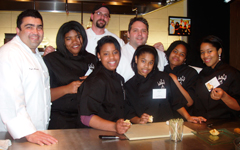"Zen Mind, Beginner's Mind", Creativity, and Backup Plans
“In the beginner’s mind there are many possibilities, but in the expert’s there are few.” – Zen Master Shunryo Suzuki
As a youth worker, I am always learning from the amazing young people in our programs. One of the best things about working with teens is the fact that every class, every conversation, and every unique group of students has its own gems of wisdom to impart, whether I realize it at the time or not. And this summer, our students have been teaching me about Zen. Maybe these high school students don’t consider themselves Zen masters, but as I’ve been reflecting on Summer Institute so far, one theme that these teens clearly have a lot to teach me about is the concept of “beginner’s mind.”
This term comes from Zen, specifically Japanese Zen. And though I’ve known about it for over a decade, I am appreciating it in a new way this summer. It popped into my mind recently after the day we made brownies, when students decided to bake them on a cookie sheet instead of a baking dish. The resulting shape and texture -- shorter in height and cut into long, thin, rectangles -- was different from other brownies I’ve had, and went against my sense of how brownies “should” be baked, but was delightfully surprising and completely delicious.
Proud students with their cookie sheet brownies
Since then, I haven’t been able to stop thinking about it. The idea of “beginner’s mind” implies an attitude of openness, curiosity, and lack of preconceptions or expectation. Despite its origins, the concept certainly isn’t limited to describing Buddhism or meditation, and, I find, really applies to life in the kitchen. Cooking, like meditation, can be mystifying to the novice. To the seasoned practitioner, it may become rote or automatic, and it’s possible to go into autopilot and lose the sense of exploration and inquisitiveness that was once central to the experience. For many of the teens in our program, cooking is a new and unfamiliar experience. They are, quite literally, beginners. Seeing the process through their eyes, I am learning, unlearning, and relearning so many things about my love for cooking. The reality is that sometimes beginners make “mistakes” -- they interpret an instruction “wrong”; they mix up ingredients; they lose track of time and overcook something. These "mistakes" happen at Brainfood. But when they do, our student always, without fail, come up with a creative, resourceful, and ultimately successful Plan B. The beginner’s mind is, I think, what makes this possible: they don’t have the limitations that years of experience can impose upon their outlook.
I shared Shunryo Suzuki’s quote with the students yesterday, and asked them what it meant to them. One student, Ronnie, summed it up perfectly. He reflected, “If you say the word ‘car’ to one of us, we know exactly what that is; we’ve seen it before. We’d say ‘yeah, so, that’s a car.’ But if you say ‘car’ to a baby, he will imagine lots of things it could mean, because he hasn’t experienced it. He’ll have so many different thoughts about what a car could be.”
Recently while making cookies, one student thought to herself, “If one spoon stirs my batter well, two spoons would stir it even better!” and coined an innovative new approach to mixing.
Joselin and her new double spoon mixing technique
A couple weeks ago, a student misinterpreted “pepper” to mean red bell pepper rather than ground black pepper, and ended up with a very chunky sauce that was supposed to be smooth. He simply pulsed it in the food processor, and the diced bell pepper became a refreshing puree that added a textural complexity and bright flavor to the sauce! Just the other day, a group of students had leftover beef and rice filling for the stuffed cabbage dish they were making, and it seemed an obvious next step to them to make them into meatloaf bites using a mini muffin tin. Putting meat in a muffin tin is not something I ever would have thought of, and to them it was a natural choice. Who knew meatloaf could be so cute?
One day during our baking unit, some cupcakes turned out extremely dry. Clearly, the texture was not what the author of the recipe intended. Getting them out of the muffin tins proved to be a crumbly mess, and there was no way they were going to stay intact. We had plenty of frosting though, and one of our students had a vision: cake pops. Instead of attempting to frost the crumbling cupcake pieces, he surrendered to the crumbs and mashed them into the frosting to make a sticky mixture of cake crumbs and frosting, easily formed into balls and skewered onto toothpicks. Moist, delicious, and adorable!
Frosting and cupcake crumb "Cake Pops" tasted just as good!
All of these innovative, resourceful ways of reimagining how things “should” go in a recipe have led to happy students, delicious meals, and lots of learning all around. As I watch these awesome young people explore in the kitchen with curiosity, courage, and big imaginations, I'm reminded that it is possible for all of us to rediscover “beginner’s mind”, in the kitchen and in our lives.







Comments
Post new comment